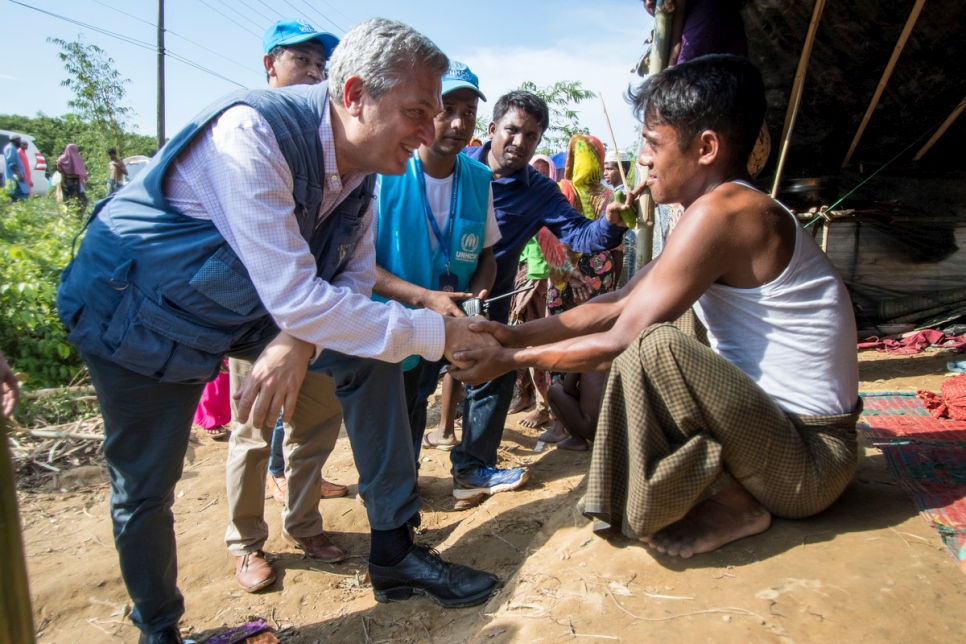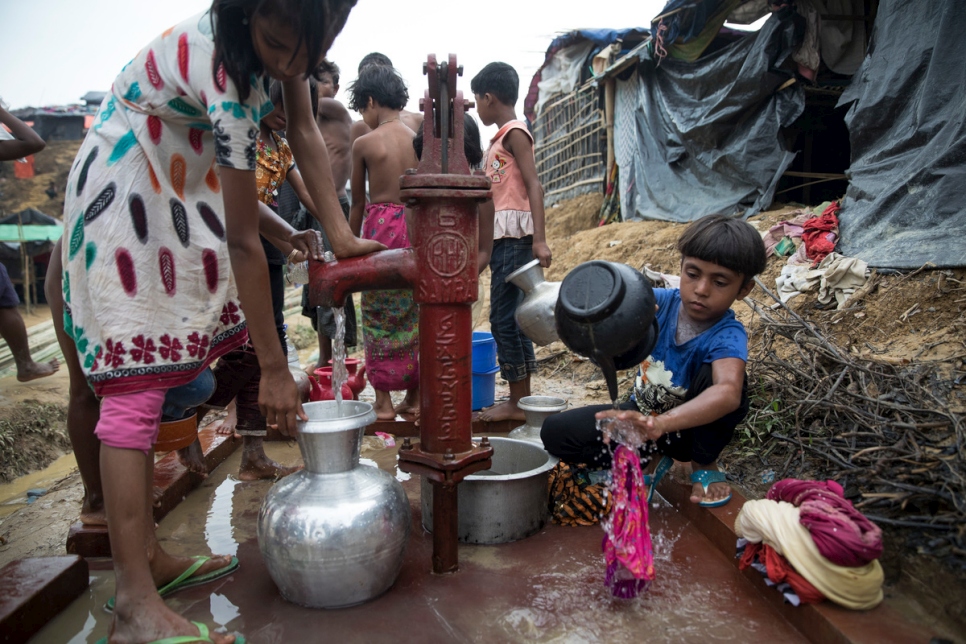Grandi highlights needs of refugees in Bangladesh
Praising response so far, UNHCR chief says he has rarely seen people in so much need.

UNHCR High Commissioner Filippo Grandi talks to a young Rohingya man at Kutupalong settlement in Cox's Bazar, Bangladesh. © UNHCR/Roger Arnold
GENEVA – Returning from a visit to the region, United Nations High Commissioner for Refugees Filippo Grandi spoke movingly today of the suffering of thousands of Rohingya refugees fleeing violence in Myanmar to Bangladesh saying he had rarely seen such need.
“I have just returned from Bangladesh, where I witnessed people fleeing unimaginable violence," he told a press conference on Wednesday (Sept 27) at Geneva’s Palais des Nations where he pin-pointed the challenges facing one of the fastest-moving and largest refugee emergencies of recent times.
Grandi, who has spent a lifetime working as a humanitarian all over the world, said he had hardly ever seen people arriving in a country of asylum with so little.
"Their needs are enormous... they need everything."
“They had to flee very sudden and cruel violence, and they have fled with nothing. Their needs are enormous – food, health, shelter,” he declared. “They have absolutely nothing. I have hardly seen in my career people that have come with so little. They need everything.”
Grandi welcomed an enormous out-pouring of solidarity on the part of the Bangladesh authorities and the international community, but cautioned that it would have to continue and deepen.
“This is not a short-term emergency… We need the help of all of you,” he said, warning: “the combination of limited health facilities, poor sanitary and hygiene conditions and overcrowded sites, you can well imagine is a recipe for disaster in terms of possible epidemics.”
The Rohingya are fleeing with nothing but the trauma they've survived.@RefugeesChief's message after meeting refugees in Bangladesh. pic.twitter.com/rkr5TpD5qf
— UN Refugee Agency (@Refugees) September 27, 2017
Last weekend, Grandi toured Kutupalong refugee camp extension in Cox’s Bazar in Bangladesh to witness at first hand the harsh conditions faced by refugees.
An estimated 480,000 have fled to Bangladesh in recent weeks.

With Balukhali refugee camp and other settlements growing on a daily basis, access to clean water is restricted to these water wells. © UNHCR/Paula Bronstein
Grandi said that at its peak there were an estimated 15,000 people a day crossing the border, and although the flow has now declined there are reports that there are still displaced inside Myanmar some of whom maybe trying to find a way to cross the border into Bangladesh.
They have fled exceptional and extraordinary violence.
“It is very difficult to predict. They have never been properly counted, there may be, perhaps 300,000 Rohingya refugees in Bangladesh previously. The total population must be somewhere between 700,000/800,000 now,” he told the media.
Grandi said the other stand-out of this crisis was the trauma carried by those who have fled what he termed “really exceptional and extraordinary” violence.
“I have spoken to several women who have been raped, or have been wounded because of their resistance to rape. I spoke to many children, shockingly absent of emotion, because they were so traumatized. They told me how they had seen their parents or relatives or friends killed in front of their eyes,” he declared.
Grandi praised the response of local people whom he said had given generously and spontaneously.
“Bangladesh is not rich country and these are not rich people giving this aid. This coupled with the decision made by the Prime Minister to keep the borders open to allow people in really must be commended. Once again a country with few resources is giving a very positive example in terms of solidarity with refugees to many countries that have many more resources and have restricted that access,” he said.
Your support is urgently needed to help the children, women and men refuges in Bangladesh. Please give now.
